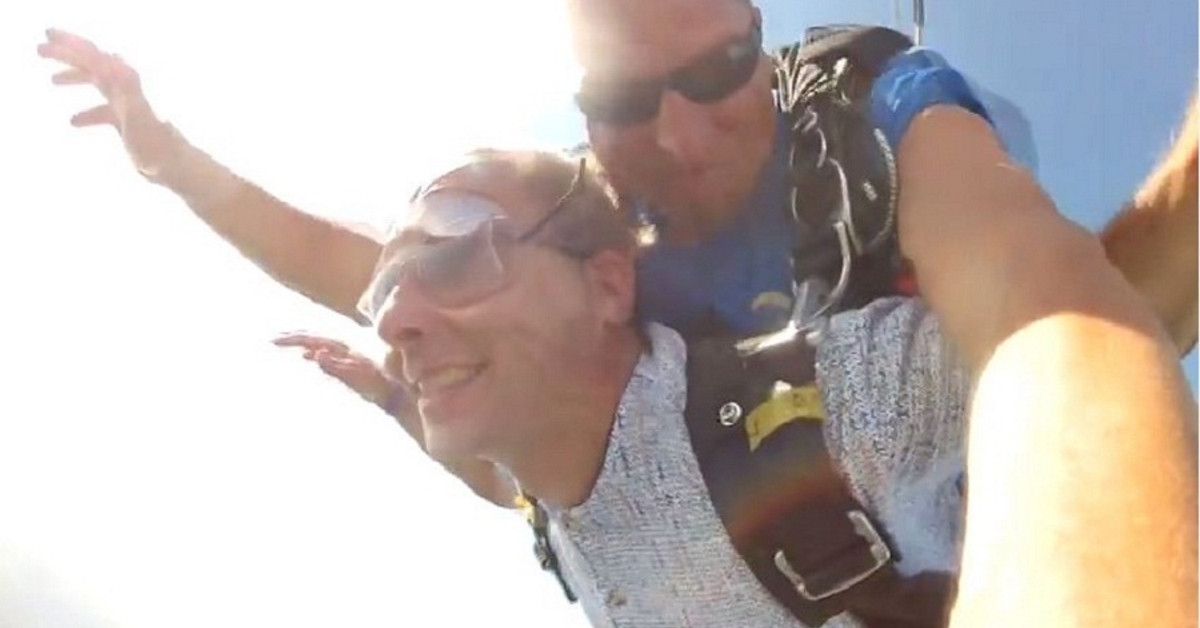I recently (2014) had the privilege to interview Michael Ellenbogen about his recent skydiving adventure. Michael was diagnosed with early-onset Alzheimer’s at the age of 49 but he doesn’t let that stop him from living life. In fact, he uses it as a reason to live life more.
 Alzheimer’s to those without an understanding of the disease conjures up a vision of an elderly person in a nursing home unable to care for themselves.
Alzheimer’s to those without an understanding of the disease conjures up a vision of an elderly person in a nursing home unable to care for themselves.
However, the general public doesn’t realize that the person in line next to them at the grocery store might be fighting the invisible foe that has inflicted more than 36 million worldwide.
Based on the idea that Alzheimer’s has 3 stages, we can surmise that roughly 1/3, or 12 million, people worldwide have mild Alzheimer’s or related dementia. That means that at a minimum, 12 million people (1.7M in USA) neighbors, friends, and family are not in a nursing home.
In fact, they are leading active lives by participating in society and having adventures.
Michael Ellenbogen is such a person. After more than a decade of having symptoms, Michael was diagnosed with early-onset Alzheimer’s at the age of 49. Michael is one of an estimated 1.4M people worldwide who have been diagnosed before the age of 65.
People who don’t understand Alzheimer’s or who don’t know Michael might be surprised to hear that he parachuted on his own accord from an airplane at 12,500 feet.
Michael, like others in his situation, was “going around and trying to figure out my bucket list” when came across a video of a skydiver with dementia.
Michael jokes that he was happy to learn that you can tandem, because “If I was to try and do it on my own, I might forget to pull the chute,” he said with a chuckle.
Michael realizes that while he can still do many things, there are some things that are just too important to not have others help.
While Michael may not remember some things such as his fear of heights (which he was reminded of by his neighbor), it’s quite obvious from our discussion that he remembers his skydiving adventure with a good deal of clarity.
In fact, he recalls that after looking at the altimeter on his watch and realizing they were at 10,000 feet he thought, “Oh, wow maybe this wasn’t the right move.”
That anxiety didn’t last long because within a few seconds they reached the desired altitude of 12,500 feet, and the instructor to whom he was strapped jumped from the plane without hesitation.
This instructor as well as the skydiving company was aware of Michael’s dementia because he “made them aware clearly, that hey, you can’t count on me.” This two-way interaction helped create a dementia-friendly skydiving adventure for Michael.
He went on to add, “They made me feel really comfortable that they would do what was necessary.”
As Alzheimer’s awareness grows and more businesses become sensitive to the challenges a person with dementia faces, people with Alzheimer’s will be able to participate more comfortably in a wider range of activities.
These activities don’t have to be as extreme as skydiving or driving a Lamborghini (Michael has this on his list as well).
But as Michael says,
“It’s so important for people to live life to its fullest.”
As Michael mentions, “life is too short,” and we can all learn from him when he talks about how we all have those fancy items that we only wear on special occasions. “Life is too precious so start wearing them now,” Michael says.
Just because a person has been diagnosed with an illness doesn’t mean they should stop being active or avoid contact with other people. On the contrary, the best way to fight back is by maintaining a purpose by staying active and social.
Michael will tell you to not put limitations on yourself. There are people out there who will help you do things you don’t think you can do.
This article originally appeared on MariaShriver.com in 2015.
Watch the conversation below:
Or listen on the go:
Download the audio file by right clicking directly on the play button below and selecting “Save audio as.”
Related TinT Article: Living Positively with Dementia Daze with Laurie Scherrer
You might also be interested in the first article I wrote after being inspired by Michael’s outgoing approach to dealing with Alzheimer’s disease, Use Alzheimer’s as a Reason to Live More
If you like what you’ve read, why not receive periodic updates when you:
Subscribe to the TinT Newsletter
Comments, or questions! Leave them below? ![]()





Leave a Reply